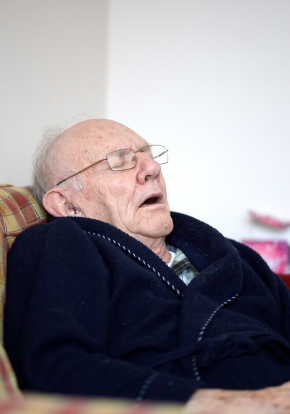 In a recent Los Angeles Times’ "Booster Shots" article, Shari Roan writes briefly about a study of nursing home resident’s sleep patterns and habits. The study, published in the Journal of American Geriatrics Society, and conducted by UCLA and the VA Greater Los Angeles Healthcare System, looked at 121 "older adults," 65 and older, living in assisted living facilities. According to the Ms. Roan, the study found: "the residents slept about six hours per night and about 1.5 hours during the day. The most common sleep problems included walking in the middle of the night or early morning or the inability to fall asleep within 30 minutes. Not surprisingly, the study also found "declining function status and quality of life and greater depression over 6 months of follow-up." That meant those residents who slept poorly required more help with their "activities of daily living," such as bathing, dressing and grooming. Unfortunately, the study does not get to the cause of the sleeplessness. Obviously, this is an important issue. What can be done?
In a recent Los Angeles Times’ "Booster Shots" article, Shari Roan writes briefly about a study of nursing home resident’s sleep patterns and habits. The study, published in the Journal of American Geriatrics Society, and conducted by UCLA and the VA Greater Los Angeles Healthcare System, looked at 121 "older adults," 65 and older, living in assisted living facilities. According to the Ms. Roan, the study found: "the residents slept about six hours per night and about 1.5 hours during the day. The most common sleep problems included walking in the middle of the night or early morning or the inability to fall asleep within 30 minutes. Not surprisingly, the study also found "declining function status and quality of life and greater depression over 6 months of follow-up." That meant those residents who slept poorly required more help with their "activities of daily living," such as bathing, dressing and grooming. Unfortunately, the study does not get to the cause of the sleeplessness. Obviously, this is an important issue. What can be done?
Two of the causes of sleeplessness in older adults in general and, likely, residents of assisted living facilities in particular, may be chronic pain and medications. Both of these causes can be addressed and, in all likelihood, fixed. The first step is, of course, recognizing the "problem" exists. The next step is to get the "team" — that is, the doctor, staff and family — involved in finding the solution. If chronic pain is the culprit, your doctor and, and should, be able to help. In terms of current medications causing sleeplessness, perhaps the dosage of medication can be adjusted or or the medicine changed all together.
No matter what the cause, the problem of sleeplessness of assisted living facility residents must be recognized, properly diagnosed and addressed. If not, the effects are long-lasting and serious.
